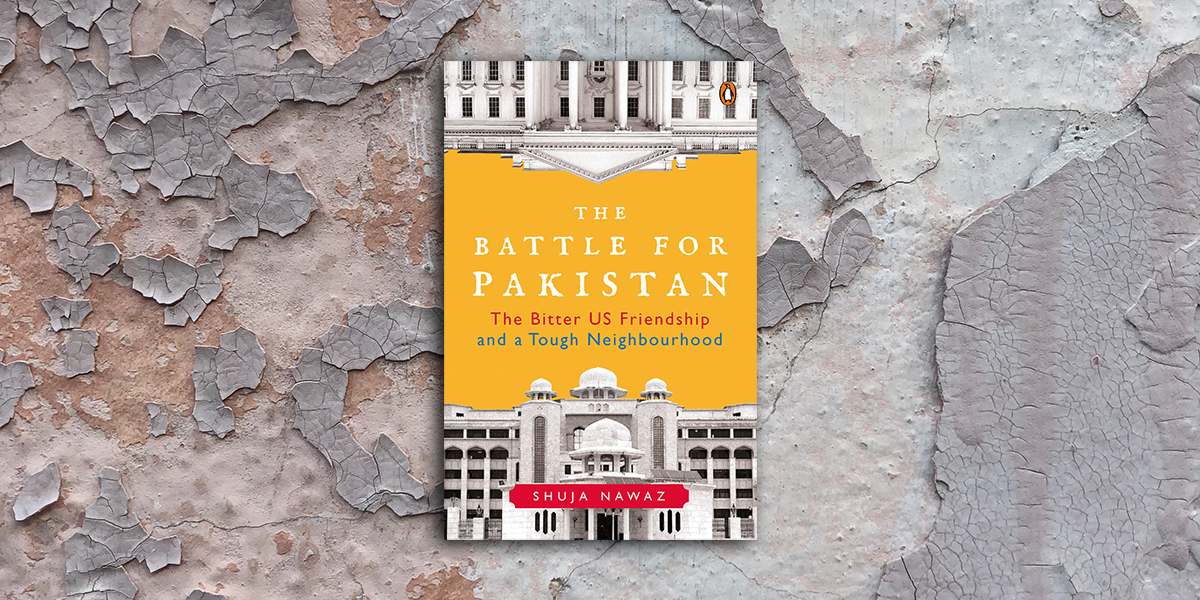
The Battle for Pakistan by Shuja Nawaz showcases a marriage of convenience between unequal partners. The relationship between Pakistan and the United States since the early 1950s has been nothing less than a whiplash-inducing roller-coaster ride. Surrounded today by hostile neighbours and with Afghanistan under increasing Indian influence, Pakistan does not wish to break ties with the US. It also does not want to become a vassal of China and get caught in the vice of a US-China rivalry, or the Arab-Iran conflict.
Based on extensive travel in the region, frequent policy interactions and many on-the-record interviews with key leaders, The Battle for Pakistan untangles the complex US relationship in the past decade. Here’s an excerpt from the preface.
Salvaging a Misalliance
The US–Pakistan relationship has often been compared to a bad marriage. Some have also described the relationship using the Chinese and Japanese sayings about an estranged couple that share the same bed but dream different dreams. It has been a true misalliance that is hurtling towards a bad break-up, but one that needs to be rescued for the sake of both parties and for the region in which Pakistan is located and where it can play a crucial role.
The French word ‘mesalliance’ was borrowed by George Bernard Shaw’s brilliant satirical play on the class battle in British society. It was based on an unequal partnership between the daughter of a businessman who made his money selling underwear, and the son of an upper-crust British proconsul in an Indian province. Indeed, the Shavian commentary from the father of the boy may also apply to the case of Pakistan and even Trumpian America today: ‘Democracy reads well; but it doesn’t act well.’ In many ways, the seventy-year-old US–Pakistan relationship, with its many ups and downs, alternately filled with both tantrums and fulsome praise for each other, has become a tragicomedy on a regional political stage, with numerous bad actors and confused heroes and heroines. Meanwhile, the sorry chorus of their hoi polloi tries to make sense of the ‘tangled web’ that the often-cynical leadership of both countries has woven. Pakistan continues to struggle to craft a democracy, as its successive governments continue to battle for supremacy with the military, even while they pretend to be ‘on the same page’. It also faces a hostile, much larger India to the east that continues to inform its security policy and its regional relationships. The US fails to fully appreciate this aspect of Pakistan’s existential struggle.
The internal Battle for Pakistan forms one side of a triangle of turmoil that reflects the country’s roller-coaster relationship with the US. The other two sides are the US relationships with the civil and the military in Pakistan. Today, as at critical junctures in the past seventy years, the US is trying to shape a new global strategy that involves preparing for economic and even military conflict with potential enemies in distant parts of the world. China is one major target of the administration of President Donald J. Trump, reflected in the Indo-Pacific alliance with India and preceded by the pivot to the Pacific of President Barack H. Obama. The US brushed off all Pakistani concerns about its tilt towards India. Russia may be another US target, though Trump, whatever his reasons, remains silent on that very real and growing conflict. The US persists in stumbling into the darkness of an ill-defined ‘war on terror’, as it struggles to place the Band-Aid of military intervention on numerous wars across the world against irregular forces of extremist Islamic warriors. It is trying to fight ideologies with military weapons. And failing. At the same time, it is preparing to confront poor Central American civilians attempting to breach its southern frontier in search of economic and political freedom. For seventeen years, the US struggled to find a direction in the seemingly endless and losing war inside Afghanistan. How it manages its military exit out of that battlefield will determine its relationship with Pakistan, Afghanistan’s larger neighbour to the east, and the US’s role in greater South Asia.
Grab your copy of The Battle for Pakistan today!









